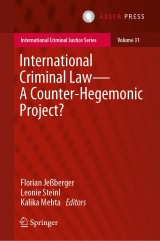Details

International Criminal Law-A Counter-Hegemonic Project?
International Criminal Justice Series, Band 31
|
149,79 € |
|
| Verlag: | T.M.C. Asser Press |
| Format: | |
| Veröffentl.: | 25.11.2022 |
| ISBN/EAN: | 9789462655515 |
| Sprache: | englisch |
Dieses eBook enthält ein Wasserzeichen.
Beschreibungen
<p>This book enquires into the counter-hegemonic capacity of international criminal justice. It highlights perspectives and themes that have thus far often been neglected in the scholarship on (critical approaches to) international criminal justice.</p><p>Can international criminal justice be viewed as a ‘counter-hegemonic’ project? And if so, under what conditions? In response to these questions, scholars and practitioners from the Global South and North reflect <i>inter alia</i> on the engagement with international criminal justice in the context of Ukraine, Palestine, and minorities in South-Asia while also highlighting the hegemonic tendencies built into the institutional structure of the International Criminal Court on the axes of gender and language.</p>
<p><b>Florian Jeßberger</b> is Professor of Criminal Law and Director of the Franz von Liszt Institute for International Criminal Justice, Humboldt-Universität zu Berlin, Germany.</p>
<p><b>Leonie Steinl</b> is a Senior Lecturer in Criminal Law at Humboldt-Universität zu Berlin, Germany.<br></p>
<p><b>Kalika Mehta</b> is an Associate Researcher at the Franz von Liszt Institute for International Criminal Justice, Humboldt-Universität zu Berlin, Germany.<br></p><p></p>
<p><b>Florian Jeßberger</b> is Professor of Criminal Law and Director of the Franz von Liszt Institute for International Criminal Justice, Humboldt-Universität zu Berlin, Germany.</p>
<p><b>Leonie Steinl</b> is a Senior Lecturer in Criminal Law at Humboldt-Universität zu Berlin, Germany.<br></p>
<p><b>Kalika Mehta</b> is an Associate Researcher at the Franz von Liszt Institute for International Criminal Justice, Humboldt-Universität zu Berlin, Germany.<br></p><p></p>
<p>Chapter 1. Hegemony and International Criminal Justice – An Introduction.- Part I. Theoretical Engagements with (Counter-) Hegemonic Perspectives on International Criminal Justice.- Chapter 2. Is International Criminal Justice the Handmaiden of the Contemporary Imperial Project? A TWAIL Perspective on Some Arenas of Contestations.- Chapter 3. Violence in International Criminal Law and Beyond.- Chapter 4. A Marxist Analysis of International Criminal Law and Its Potential as a Counter-Hegemonic Project.- Part II. (Counter-) Hegemonic International Criminal Justice in Practice: Case Studies.- Chapter 5. Double Whammy: Targeted Minorities in South-Asian States.- Chapter 6. States of Criminality: International (Criminal) Law, Palestine, and the Sovereignty Trap.- Chapter 7. The Counter-Hegemonic Turn to ‘Entrepreneurial Justice’ in International Criminal Investigations and Prosecutions Relating to Crimes Committed in Syria and Eastern Ukraine.- Chapter 8. NGOs and the Legitimacy of International Criminal Justice: The Case of Uganda.- Part III. (Counter-) Hegemony at the International Criminal Court.- Chapter 9. The Global South and the Drafting of the Subject-Matter Jurisdiction of the International Criminal Court.- Chapter 10. The International Criminal Court and Traditional Islamic Legal Scholarship: Analyzing the War Crimes Against Civilians.- Chapter 11. The International Criminal Court’s Role in Countering Patriarchal Claims in Reproductive Justice.- Chapter 12. The Impact of English Language Hegemony at the International Criminal Court.- Chapter 13. Gender Imbalance at the International Criminal Court: The Continued Hegemonic Entrenchment of Male Privilege in International Criminal Law.</p>
This book enquires into the counter-hegemonic capacity of international criminal justice. It highlights perspectives and themes that have thus far often been neglected in the scholarship on (critical approaches to) international criminal justice.<p>Can international criminal justice be viewed as a ‘counter-hegemonic’ project? And if so, under what conditions? In response to these questions, scholars and practitioners from the Global South and North reflect <i>inter alia</i> on the engagement with international criminal justice in the context of Ukraine, Palestine, and minorities in South-Asia while also highlighting the hegemonic tendencies built into the institutional structure of the International Criminal Court on the axes of gender and language.</p><p><b>Florian Jeßberger</b> is Professor of Criminal Law and Director of the Franz von Liszt Institute for International Criminal Justice, Humboldt-Universität zu Berlin, Germany.</p><p><b>Leonie Steinl</b> is a Senior Lecturer in Criminal Law at Humboldt-Universität zu Berlin, Germany.<br></p><p><b>Kalika Mehta</b> is an Associate Researcher at the Franz von Liszt Institute for International Criminal Justice, Humboldt-Universität zu Berlin, Germany.</p>
The book fills a gap in the existing literature on international criminal justice and human rights The book provides critical perspectives on international criminal justice The book includes contributions from quite a number of scholars from the Global South

















